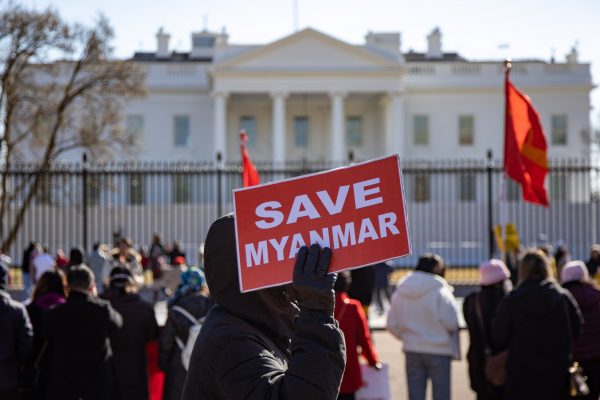In 2017, the Tatmadaw, air force, police force and armed civilians engaged in a systematic campaign of violence against the Rohingya. This included arbitrary arrest, torture, sexual violence, killing and forced displacement. Over 700,000 Rohingya were forced to flee and at least 362 villages were partially or completely destroyed.
Genocide is a term given to the systematic and widespread targeting and killing of a population with the ‘intent to destroy, in whole or in part, a national, ethnic, racial, or religious group’. Since it acceded to the Genocide Convention in 1988, the US government has only recognised eight situations as genocide, including this most recent determination. US President Joe Biden has labelled Russian President Vladimir Putin a war criminal on multiple occasions. Recently, Biden accused Putin of committing genocide in Ukraine. Although not an official determination, the Myanmar case is of interest beyond Myanmar given the proactive stance of the current US administration in calling out states for mass atrocities.
From a legal standpoint, the benchmark for determining genocide is higher than for crimes against humanity and war crimes, as proving intent as part of an organised policy of extermination requires demanding evidence. Yet the crime of genocide has a particular resonance given its association with exceptional cases of brutality such as the Holocaust and the Rwandan genocide.
The determination that a mass atrocity situation constitutes genocide is rare and implies political and moral responsibility for the United States to act — a key reason for restraint in making this determination. But what these actions should entail is indeterminate.
The United States will need to manage expectations that arise from its determination. Expectations are particularly strong from the population of Myanmar. Civilian protesters against the February 2021 military coup have invoked the Responsibility to Protect doctrine in calling for international assistance. The coup was led by the same general, Min Aung Hlaing, who was responsible for the 2017 Rohingya genocide — a link that will not go unnoticed by the active civilian opposition groups in Myanmar.
The US position, a response to calls from civil society and experts and its own investigations, will encourage members of the international community to take a stronger stance in calling out the Myanmar regime’s abuses. The US response to date, as with its Western counterparts, has been limited to sanctions, arms embargoes, humanitarian assistance and pressing for accountability. Unlike the situations in Ukraine and Syria, Washington has not provided military support to the armed opposition that would likely escalate the conflict and destabilise the country.
The genocide determination is unlikely to change that. But the United States followed its statement with a series of measures to pressure the military regime in Myanmar, including stepping up sanctions to cut arms supplies.
It has committed nearly US$1 million in new funding for the UN Independent Investigative Mechanism for Myanmar, which has already concluded that crimes against humanity falling within its mandate have likely been committed in Myanmar. By boosting capacity to investigate international crimes committed by the Tatmadaw, the additional funding will help provide concrete evidence required for legal proceedings against Myanmar’s military leaders.
Current proceedings underway to hold Myanmar’s top generals accountable include a case brought by The Gambia at the International Court of Justice charging Myanmar’s military leaders with genocide and ongoing investigations into allegations of war crimes at the International Criminal Court. Another case is underway in Argentina’s domestic courts under the principle of universal jurisdiction to try Myanmar’s military for genocide against the Rohingya.
Despite the progress made through formal accountability mechanisms, the situation for civilians in Myanmar is dire. The civilian opposition-led National Unity Government has called for a ‘People’s Defensive War’, which has resulted in nationwide conflict between the military and armed civilian opposition groups, with some support from ethnic armed organisations. Navigating this terrain to find a ‘pathway out of genocide’ as Blinken advocates will not be straightforward.
Rohingya testimonies of the brutality and terror they experienced at the hands of the Tatmadaw are conscious-shocking. Despite the lessons of 2017, the international response to the 2021 coup has been lukewarm, failing again to prevent ongoing human rights abuses.
The US determination is a landmark moment. The United States has taken a clear moral stance by calling out the brutality committed by Myanmar’s military for what it is — genocide and crimes against humanity. Other countries should follow the example set by it and other states such as The Gambia and Argentina.
The pathway out of genocide will require coordinated international measures to cut off the Myanmar military regime from funding, weapons, legitimacy and political support. Achieving this in a geopolitically divided international arena — when the world’s attention remains fixed on Russia and Ukraine — is a significant challenge.
Cecilia Jacob is Associate Professor in the Department of International Relations at the Coral Bell School, The Australian National University and Visiting Fellow (2022) at the Institute for Ethics, Law and Armed Conflict, University of Oxford. She edits the journal Global Responsibility to Protect.


Two additional points should be added. First, it takes many years for the ICC or some other body to prosecute such a case. A recent example is that it required 20 years or so for the Serbian leader to be convicted. Second, as long as China continues to provide economic and military support to the generals running Myanmar any efforts to get them to alter their policies will not gain any traction.
At best, a very long road lies ahead.